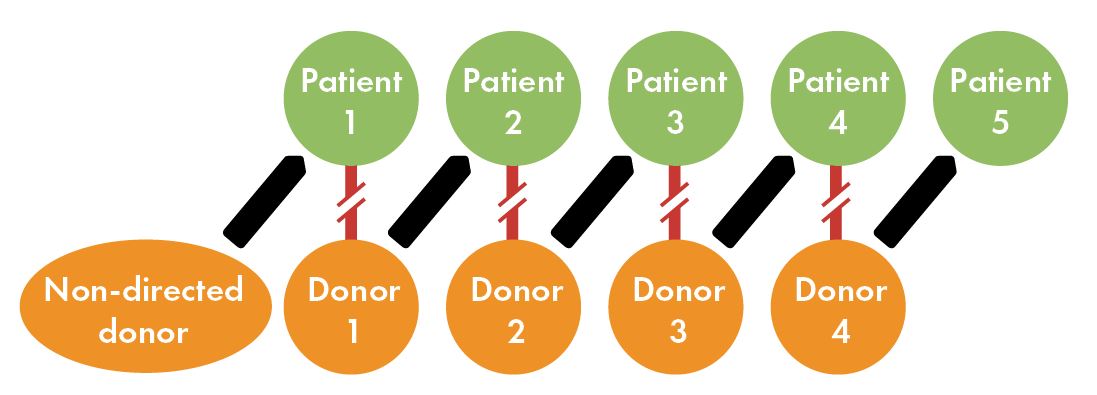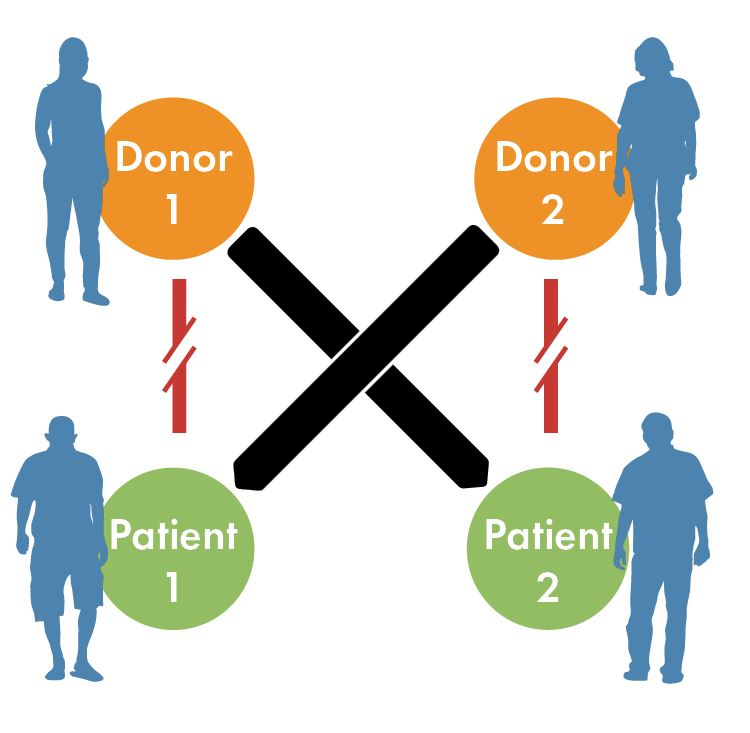I am Dave and I need a kidney to live. Not necessarily your
kidney, but someone’s.
You can help to save my life by sharing this post on FaceBook or other social medium.
Together we can find that angel willing to do the extraordinary by giving the gift of life to save me.
Sharing is Like Tossing a Life Preserver to a Drowning Person:
Sharing this post is like throwing a life preserver into the water to save a person in peril.
I'm not asking you to jump into the water with me. I'm asking only that you throw me that life preserver in your hands. Just toss it in. Just share this post.
As we grow our audience, my chance of receiving a life-saving kidney transplant increases greatly.
How to Help Me:
Please take a few minutes to use Facebook for a good purpose - to tell the world about me and this website. Post a small public note on Facebook with a link to this website (icon above) and share it to public, not just your friends (so your friends' friends can see it).
My Hospital:
I am approved for kidney transplant at NY Presbyterian Weill Cornell in NYC. However, through the National Kidney Registry a donor can donate at any of 85 hospitals throughout the U.S. Their kidney, designated for my benefit, could go to me or to someone whose own donor's kidney would go to me by way of a kidney transplant chain.
Your questions will be answered by a qualified professional who is familiar with my case. I will not be told of your inquiry. Your confidential phone call will provide you with information without any obligation to proceed further.
What if A Prospective Donor is Not a Compatible Match? In a Kidney Transplant Chain exchange involves a pool of patients where each is paired with a donor willing to donate but who is incompatible because of differences in blood type or other tissue sensitivities. Donors within the exchange are swapped among incompatible pairs to allow for more transplants. This arrangement increases the number of transplants dramatically. That saves many lives.
The National Kidney Registry (NKR) has facilitated more than 3,300 transplants at 85 centers, and the numbers are rapidly increasing. The NKR matches donors and recipients in transplant chains. Kidneys are transported with geotracking devices. This reduces the need for donor travel and increases the geographic area where matches can be made.
Another arrangement is called a paired kidney exchange, also known as a “kidney swap.” That occurs when a living kidney donor is incompatible with the recipient. If an incompatible donor wants to donate their kidney for Dave and is willing to participate in a donor swap, Dave's donor's kidney would be swapped with another donor's kidney that is incompatible with their recipient but whose kidney is compatible with Dave. That saves two lives.
All Expenses are Paid:
All donor expenses* (medical, out of pocket, lost wages, etc.) will be paid by insurance and by our family.*
Help Me by Sharing: Even if you’re not a potential donor yourself, someone among your social media friends might be! Sharing this post could save my life. What a wonderful gift that would be.
Thank you,
David and Susan Natale
-------------------------
*About Costs: Reasonable cost reimbursement is legal. Title III of The National Organ Transplant Act, 1984, Pub. L. 998-507, allows for reasonable payments associated with the removal, transportation, implantation, processing, preservation, quality control, and storage of human organs as well as for the expenses of travel, housing, and lost wages incurred by the donor of a human organ in connection with the donation of that organ. While reimbursement of expenses is legal, payment for the acquisition of an organ is not.
In addition, our medical insurance covers the costs of medical care and hospitalization for the donor as well as for the recipient.
You can help to save my life by sharing this post on FaceBook or other social medium.
Together we can find that angel willing to do the extraordinary by giving the gift of life to save me.
Susan and Dave Natale
Sharing is Like Tossing a Life Preserver to a Drowning Person:
Sharing this post is like throwing a life preserver into the water to save a person in peril.
I'm not asking you to jump into the water with me. I'm asking only that you throw me that life preserver in your hands. Just toss it in. Just share this post.
As we grow our audience, my chance of receiving a life-saving kidney transplant increases greatly.
How to Help Me:
Please take a few minutes to use Facebook for a good purpose - to tell the world about me and this website. Post a small public note on Facebook with a link to this website (icon above) and share it to public, not just your friends (so your friends' friends can see it).
My Hospital:
I am approved for kidney transplant at NY Presbyterian Weill Cornell in NYC. However, through the National Kidney Registry a donor can donate at any of 85 hospitals throughout the U.S. Their kidney, designated for my benefit, could go to me or to someone whose own donor's kidney would go to me by way of a kidney transplant chain.
Speak with Someone Confidentially about Kidney Donation and Without Obligation: Call NewYork-Presbyterian Kidney Transplant Program at Weill Cornell Medicine. They will not disclose your inquiry to Dave or his family. Please mention David Natale when you call:
Your questions will be answered by a qualified professional who is familiar with my case. I will not be told of your inquiry. Your confidential phone call will provide you with information without any obligation to proceed further.
If you would like to be screened as a potential kidney donor, please see Donor Screening Questionnaire and Weill-Cornell will send you a link to begin the medical screening process.
What if A Prospective Donor is Not a Compatible Match? In a Kidney Transplant Chain exchange involves a pool of patients where each is paired with a donor willing to donate but who is incompatible because of differences in blood type or other tissue sensitivities. Donors within the exchange are swapped among incompatible pairs to allow for more transplants. This arrangement increases the number of transplants dramatically. That saves many lives.
The National Kidney Registry (NKR) has facilitated more than 3,300 transplants at 85 centers, and the numbers are rapidly increasing. The NKR matches donors and recipients in transplant chains. Kidneys are transported with geotracking devices. This reduces the need for donor travel and increases the geographic area where matches can be made.
Another arrangement is called a paired kidney exchange, also known as a “kidney swap.” That occurs when a living kidney donor is incompatible with the recipient. If an incompatible donor wants to donate their kidney for Dave and is willing to participate in a donor swap, Dave's donor's kidney would be swapped with another donor's kidney that is incompatible with their recipient but whose kidney is compatible with Dave. That saves two lives.
All Expenses are Paid:
All donor expenses* (medical, out of pocket, lost wages, etc.) will be paid by insurance and by our family.*
From the Donor's and the Recipient's Perspectives:
Ned Brooks, Non-directed Kidney Donor
Founder of DonorToDonor.org
Delivers TEDx Talk on his Experience as a Donor
Kathie: A Kidney Recipient's Story
at Weill Cornell Transplant Center
Delivers TEDx Talk on his Experience as a Donor
at Weill Cornell Transplant Center
Dr. Sandip Kapur, Chief of Transplant Surgery
Director of the Kidney and Pancreas Transplant Programs
NewYork-Presbyterian/Weill Cornell Medical Center
Help Me by Sharing: Even if you’re not a potential donor yourself, someone among your social media friends might be! Sharing this post could save my life. What a wonderful gift that would be.
Thank you,
David and Susan Natale
-------------------------
*About Costs: Reasonable cost reimbursement is legal. Title III of The National Organ Transplant Act, 1984, Pub. L. 998-507, allows for reasonable payments associated with the removal, transportation, implantation, processing, preservation, quality control, and storage of human organs as well as for the expenses of travel, housing, and lost wages incurred by the donor of a human organ in connection with the donation of that organ. While reimbursement of expenses is legal, payment for the acquisition of an organ is not.
In addition, our medical insurance covers the costs of medical care and hospitalization for the donor as well as for the recipient.





